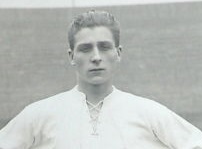|
Billy
Butler |
Bolton Wanderers FC
1 appearance, 0 goals
P 1 W 0 D 1 L 0 F 1:
A 1
50% successful
1924
captain: none
minutes played: 90 |
|
 |
|
Timeline |
| |
William Butler |
|
Birth |
27 March 1900 in
Atherton, Bolton, Lancashire [registered in
Leigh, June 1900]. |
|
Baptism |
15 April 1900 in St
Michaels and All Angels Church, Howe Bridge, Atherton, Bolton. |
|
|
According to the 1901 census,
William is the youngest of three children to William and Mary Elizabeth,
living at 161 Leigh Road in Leigh. His father is a coal mine hewer. |
|
|
According to the 1911 census,
William now has four more younger siblings. Still with their parents,
still in Leigh Road and father is still a hewer in the coal mines. |
|
|
According to the 1921 census,
William is a collier drawer, and is the oldest of seven children still
living at home with their parents still at 161 Leigh Road.
|
|
|
According to the 1939 register, William is married, working at the
munitions factory, and living at 12 Bray Road in Guildford. |
|
Death |
11 July 1966 in
Durban, South Africa,
aged
66 years 106 days
[not registered in England]. |
|
Source |
 Douglas Lammings' An
English Football Internationalist Who's Who [1990] & Douglas Lammings' An
English Football Internationalist Who's Who [1990] & |
|
Playing Career |
|
Club(s) |
Started his
career with Howe Bridge FC before he joined the Royal North Lancashire
Regiment when he was nineteen years old where he became a centre-forward
playing Army football. It was from that position that he signed for
Atherton Collieries FC of the Bolton Combination, after leaving the army.
It was in one of those combination matches that we has spotted by Bolton
Wanderers FC who duly signed him in April 1921, switching him to
outside-right. After Bolton were relegated, Butler requested a transfer,
after 407 league appearances and 65 goals, and he was on on his way to
Reading FC on 2 June 1933. He was appointed manager at Reading FC on 30
August 1935 with the intention of carrying on his playing, but he never
did. He turned out for Guilford City FC in 1940. |
|
Club honours |
FA Cup winners
1922-23, 1925-26, 1928-29; Football League Division Three South
runners-up 1934-35, |
|
Individual honours |
None |
|
Distinctions |
None |
|
Height/Weight |
5'
7", 10st.
10lbs [1923]. |
|
Source |
Douglas Lammings' An English
Football Internationalist Who's Who [1990]. |
|
Management
Career |
|
Club(s) |
On 30 August
1935, Butler took over as Reading FC manager, becoming the youngest at the
time. He resigned on 10 February 1939, effective at the season's ending, for personal reasons and then took over
at Guildford City FC on 26 June 1939, whom he also played for. He also became a PT instructor in the RAF during WW2
and then managed Torquay United FC from 18 July 1945 until his resignation
on 15 May 1946. Managed
Johannesburg Rangers FC of South Africa and coached Pietermaritzburg &
District FA. He subsequently coached for the Rhodesian FA.
He was one of the ten men interviewed for the Newcastle United FC
manager's job in May 1947, the job going to George Martin. |
|
Club honours |
Division Three South Cup winners
1937-38; |
|
England Career |
|
Player number |
One of two who became the 472nd
players (473) to appear for England. |
|
Position(s) |
Outside-right |
|
Only match |
No. 140,
12 April 1924, England 1 Scotland
1,
a British Championship match at Empire Stadium,
Wembley, London, aged 24 years
16 days. |
|
Major tournaments |
British Championship 1923-24; |
|
Team honours |
None |
|
Individual honours |
None |
|
Distinctions |
Butler and
Charlie Spencer were the first England debutants at Wembley. |
|
Beyond England |
|
After leaving Torquay, he st up a
business in Camberwell, London. In February 1948, The Football Association
sent Butler on a goodwill tour of South Africa. He emigrated soon after, continuing his management career. -
An English Football Internationalists' Who's Who.
Douglas Lamming (1990). Hatton Press, p.56. |